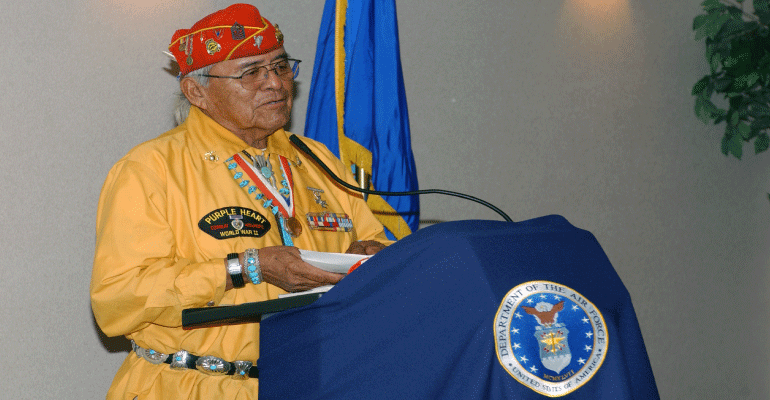
On Thursday morning, Navajo Code Talker Teddy Draper Sr., of Chinle, Arizona, passed away in a Prescott nursing home. He was 93.
Navajo Code Talker Draper was awarded the Purple Heart in 2004 for his service in WWII which cost him most of his hearing in one ear when a shell exploded close to him on Mount Suribachi.
In 2004, Navajo Code Talker Draper described his experience in a visit to Cannon Air Force Base in New Mexico:
“When we were at the induction station in 1943 taking the entrance tests, I told them I wanted to join the Air Force,” Mr. Draper said. “They said … I was going into the Marines.”
Mr. Draper said he had been happy on the reservation, learning the ways of his ancestors when he and many of his fellow Navajo decided to fight for their country.
“We did eight weeks of basic training, then they sent us to Camp Pendleton for eight weeks of communications training,” he said. “We had to learn to be radio operators (and) switchboard operators who sit in the command posts, and even how to run cable.”
“We had a lot to learn in a short time. We developed a code based on our language. It wasn’t just us talking in Navajo. We had to develop code words to make it even more difficult to break,” Mr. Draper said.
After training in Hawaii to learn how to disembark a troop ship and storm a beach, Mr. Draper and the rest of the 5th Marine Division headed west to take on the Japanese.
Then-Private Draper and his fellow Marines hit the beaches of Iwo Jima on Feb. 19, 1945, walking into a wall of Japanese gunfire that raked the sand from one end of the beach to another.
“We had nothing to hide behind,” Mr. Draper said. “They hit us with everything they had — rifle fire, machine gun fire and artillery. It was like hail hitting the sand.”
The Code Talker vividly recalls those first hours on the beach at the foot of Mount Suribachi. He also recalls the first time he escaped death.
“I was running from crater to crater with four other Navajo, and I felt something smack my pants,” Mr. Draper said. “I looked down and saw a bullet hole in my pants near my shin. I yelled back at the Japanese that they had missed their only chance to kill this Navajo.”
Mr. Draper jumped into a large bomb crater and began setting up his equipment when he discovered a missing cable which was needed to connect the radios. The radios were connected to Mr. Draper’s switchboard by those cables so that commanders could issue orders to individual outposts and the outposts could report what they were seeing in the battle.
His sergeant ordered him to go back to the landing craft and get it. So, Mr. Draper had to make a mad dash 150 yards back to the water and then run back to the temporary command post.
“My sergeant told me I had earned a medal for that. I told him I wasn’t interested in a medal; I wanted to be promoted. A couple of days later, I was a corporal,” he said.
The Japanese almost made the Code Talker eat his words the second day on the beach.
“A mortar hit about 20 yards to my right and killed two men I was with,” Mr. Draper said. “It made me blind and deaf for a little while, but I went to the aid station, and they fixed me up, and I went back to work. By that time, there were only a couple of Navajo left alive to run the radios for the entire division, so I wasn’t allowed to be wounded.”
In the explosion, a piece of shrapnel had smacked Mr. Draper on the bridge of his nose. He considers himself very lucky to be alive.
Navajo Code Talker Draper was a Navajo language instructor. He developed a curriculum and workbook that are still in use.
In 2013, Navajo Code Talker Draper was awarded the Arizona Indian Living Treasures Award.
